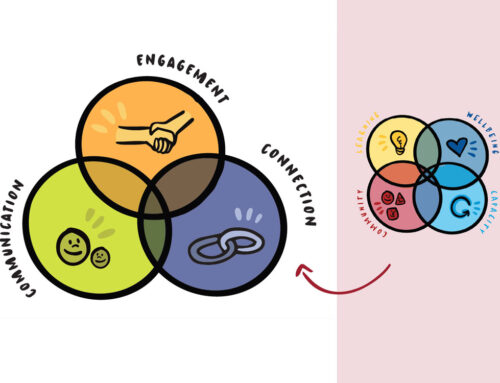DEVELOPING A RECONCILIATION ACTION PLAN

Ochre blowing artwork created by our community at Agfest 2023, in collaboration with Trish Hodge from NITA Education.
In an exciting step forward for our College community, Scotch Oakburn College will embark on the development of a Reconciliation Action Plan (RAP) in 2025. This year-long strategic initiative reflects our deep commitment to fostering reconciliation with First Nations Peoples.
A RAP is more than a document; it is a framework for action and accountability that builds understanding, respect, and opportunities for meaningful engagement with Aboriginal and Torres Strait Islander peoples in the classroom, around the College and with our community. At its heart lies a shared journey of learning, connection, and collaboration to strengthen relationships with the land’s Traditional Custodians and to shape a more inclusive, equitable future.
A Vision for Reconciliation
The development of our RAP aligns closely with Scotch Oakburn College’s Values to inspire compassion, courage, and respect in its community. By undertaking this project, we aim to:
- Deepen awareness of First Nations histories, cultures, and contributions.
- Strengthen the College’s relationship with the Tasmanian Aboriginal community and First Nations Peoples across Australia.
- Identify opportunities for reconciliation, equity, and advocacy in our programs, practices, and culture.
The RAP initiative is not just a project, but a cornerstone of our broader commitment to inclusivity and respect. It reflects our belief that education can play a transformative role in reconciliation.
A Collaborative Effort
Reconciliation is not the work of any one individual or group—it is a collective responsibility. As a College, we are committed to fostering a sense of shared ownership and accountability for this important work. While the RAP will provide a framework for action, its success will depend on the commitment and engagement of the entire Scotch Oakburn community.
In 2025, our RAP journey will begin with a workshop, led by Aboriginal leaders Graeme Gardner and AJ King. This session will include a Welcome to Country, a smoking ceremony, and opportunities to reflect on ancestry, cultural heritage, and connections to Country. It will set the stage for the RAP’s development, providing insights and a framework to guide the year ahead.
This initiative will also involve a dedicated group of staff members who have expressed their passion and interest in contributing to the project. Their diverse perspectives will be central to creating a plan that is both meaningful and actionable. The team will work collaboratively with Graeme and AJ throughout the year to identify key opportunities for reconciliation within our community and ensure the RAP reflects both the aspirations and the lived experiences of First Nations Peoples.
Guiding Principles
At the heart of our RAP development is the principle of listening deeply to First Nations voices. By engaging with Aboriginal and Torres Strait Islander leaders and communities, we seek to learn from their perspectives and experiences to build a foundation of mutual respect. This process is also an opportunity to reflect on our own histories—both personal and institutional—and to confront the legacy of colonisation while fostering a culture of inclusion and allyship.
Our commitment to reconciliation is driven by the belief that education is a powerful tool for change. Through this project, we aim to embed reconciliation into our College’s DNA, ensuring it informs decision-making, teaching, and community engagement for generations to come.
The RAP Journey?
The development of the RAP represents a unique opportunity to create a lasting impact on our College community and beyond. By embedding the principles of reconciliation into the fabric of Scotch Oakburn College, we can contribute to a broader societal shift toward equity, justice, and respect for First Nations voices.
As we move forward, the RAP will serve as a guiding document, helping us to create tangible outcomes that strengthen relationships with First Nations Peoples. It will offer a roadmap for ongoing learning and collaboration, ensuring reconciliation remains at the forefront of our actions.
This journey also offers an opportunity to reflect on our shared identity and connection to Country. The process will encourage all members of the College community to think critically about the ways in which we can contribute to reconciliation—not just through formal actions, but through daily interactions and choices that promote understanding and respect.
We are excited to begin this journey and encourage all members of our community to reflect on their role in reconciliation. Together, we have the opportunity to create meaningful change that not only enriches our College but also contributes to a broader vision of a fairer and more equitable Australia.
Joel Brewer
Director, Marketing and Community










